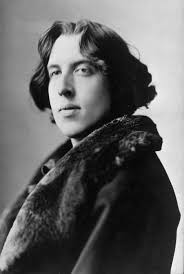The Picture of Dorian Gray Page #5
The Picture of Dorian Gray is a Gothic and philosophical novel by Oscar Wilde, first published complete in the July 1890 issue of Lippincott's Monthly Magazine. Fearing the story was indecent, prior to publication the magazine's editor deleted roughly five hundred words without Wilde's knowledge.
"I am very glad you didn't, Harry." "Why?" "I don't want you to meet him." "You don't want me to meet him?" "No." "Mr. Dorian Gray is in the studio, sir," said the butler, coming into the garden. "You must introduce me now," cried Lord Henry, laughing. The painter turned to his servant, who stood blinking in the sunlight. "Ask Mr. Gray to wait, Parker: I shall be in in a few moments." The man bowed and went up the walk. Then he looked at Lord Henry. "Dorian Gray is my dearest friend," he said. "He has a simple and a beautiful nature. Your aunt was quite right in what she said of him. Don't spoil him. Don't try to influence him. Your influence would be bad. The world is wide, and has many marvellous people in it. Don't take away from me the one person who gives to my art whatever charm it possesses: my life as an artist depends on him. Mind, Harry, I trust you." He spoke very slowly, and the words seemed wrung out of him almost against his will. "What nonsense you talk!" said Lord Henry, smiling, and taking Hallward by the arm, he almost led him into the house. CHAPTER 2 As they entered they saw Dorian Gray. He was seated at the piano, with his back to them, turning over the pages of a volume of Schumann's "Forest Scenes." "You must lend me these, Basil," he cried. "I want to learn them. They are perfectly charming." "That entirely depends on how you sit to-day, Dorian." "Oh, I am tired of sitting, and I don't want a life-sized portrait of myself," answered the lad, swinging round on the music-stool in a wilful, petulant manner. When he caught sight of Lord Henry, a faint blush coloured his cheeks for a moment, and he started up. "I beg your pardon, Basil, but I didn't know you had any one with you." "This is Lord Henry Wotton, Dorian, an old Oxford friend of mine. I have just been telling him what a capital sitter you were, and now you have spoiled everything." "You have not spoiled my pleasure in meeting you, Mr. Gray," said Lord Henry, stepping forward and extending his hand. "My aunt has often spoken to me about you. You are one of her favourites, and, I am afraid, one of her victims also." "I am in Lady Agatha's black books at present," answered Dorian with a funny look of penitence. "I promised to go to a club in Whitechapel with her last Tuesday, and I really forgot all about it. We were to have played a duet together--three duets, I believe. I don't know what she will say to me. I am far too frightened to call." "Oh, I will make your peace with my aunt. She is quite devoted to you. And I don't think it really matters about your not being there. The audience probably thought it was a duet. When Aunt Agatha sits down to the piano, she makes quite enough noise for two people." "That is very horrid to her, and not very nice to me," answered Dorian, laughing. Lord Henry looked at him. Yes, he was certainly wonderfully handsome, with his finely curved scarlet lips, his frank blue eyes, his crisp gold hair. There was something in his face that made one trust him at once. All the candour of youth was there, as well as all youth's passionate purity. One felt that he had kept himself unspotted from the world. No wonder Basil Hallward worshipped him. "You are too charming to go in for philanthropy, Mr. Gray--far too charming." And Lord Henry flung himself down on the divan and opened his cigarette-case. The painter had been busy mixing his colours and getting his brushes ready. He was looking worried, and when he heard Lord Henry's last remark, he glanced at him, hesitated for a moment, and then said, "Harry, I want to finish this picture to-day. Would you think it awfully rude of me if I asked you to go away?" Lord Henry smiled and looked at Dorian Gray. "Am I to go, Mr. Gray?" he asked. "Oh, please don't, Lord Henry. I see that Basil is in one of his sulky moods, and I can't bear him when he sulks. Besides, I want you to tell me why I should not go in for philanthropy." "I don't know that I shall tell you that, Mr. Gray. It is so tedious a subject that one would have to talk seriously about it. But I certainly shall not run away, now that you have asked me to stop. You don't really mind, Basil, do you? You have often told me that you liked your sitters to have some one to chat to." Hallward bit his lip. "If Dorian wishes it, of course you must stay. Dorian's whims are laws to everybody, except himself." Lord Henry took up his hat and gloves. "You are very pressing, Basil, but I am afraid I must go. I have promised to meet a man at the Orleans. Good-bye, Mr. Gray. Come and see me some afternoon in Curzon Street. I am nearly always at home at five o'clock. Write to me when you are coming. I should be sorry to miss you." "Basil," cried Dorian Gray, "if Lord Henry Wotton goes, I shall go, too. You never open your lips while you are painting, and it is horribly dull standing on a platform and trying to look pleasant. Ask him to stay. I insist upon it." "Stay, Harry, to oblige Dorian, and to oblige me," said Hallward, gazing intently at his picture. "It is quite true, I never talk when I am working, and never listen either, and it must be dreadfully tedious for my unfortunate sitters. I beg you to stay." "But what about my man at the Orleans?" The painter laughed. "I don't think there will be any difficulty about that. Sit down again, Harry. And now, Dorian, get up on the platform, and don't move about too much, or pay any attention to what Lord Henry says. He has a very bad influence over all his friends, with the single exception of myself." Dorian Gray stepped up on the dais with the air of a young Greek martyr, and made a little moue of discontent to Lord Henry, to whom he had rather taken a fancy. He was so unlike Basil. They made a delightful contrast. And he had such a beautiful voice. After a few moments he said to him, "Have you really a very bad influence, Lord Henry? As bad as Basil says?" "There is no such thing as a good influence, Mr. Gray. All influence is immoral--immoral from the scientific point of view." "Why?" "Because to influence a person is to give him one's own soul. He does not think his natural thoughts, or burn with his natural passions. His virtues are not real to him. His sins, if there are such things as sins, are borrowed. He becomes an echo of some one else's music, an actor of a part that has not been written for him. The aim of life is self-development. To realize one's nature perfectly--that is what each of us is here for. People are afraid of themselves, nowadays. They have forgotten the highest of all duties, the duty that one owes to one's self. Of course, they are charitable. They feed the hungry and clothe the beggar. But their own souls starve, and are naked. Courage has gone out of our race. Perhaps we never really had it. The terror of society, which is the basis of morals, the terror of God, which is the secret of religion--these are the two things that govern us. And yet--"
Translation
Translate and read this book in other languages:
Select another language:
- - Select -
- 简体中文 (Chinese - Simplified)
- 繁體中文 (Chinese - Traditional)
- Español (Spanish)
- Esperanto (Esperanto)
- 日本語 (Japanese)
- Português (Portuguese)
- Deutsch (German)
- العربية (Arabic)
- Français (French)
- Русский (Russian)
- ಕನ್ನಡ (Kannada)
- 한국어 (Korean)
- עברית (Hebrew)
- Gaeilge (Irish)
- Українська (Ukrainian)
- اردو (Urdu)
- Magyar (Hungarian)
- मानक हिन्दी (Hindi)
- Indonesia (Indonesian)
- Italiano (Italian)
- தமிழ் (Tamil)
- Türkçe (Turkish)
- తెలుగు (Telugu)
- ภาษาไทย (Thai)
- Tiếng Việt (Vietnamese)
- Čeština (Czech)
- Polski (Polish)
- Bahasa Indonesia (Indonesian)
- Românește (Romanian)
- Nederlands (Dutch)
- Ελληνικά (Greek)
- Latinum (Latin)
- Svenska (Swedish)
- Dansk (Danish)
- Suomi (Finnish)
- فارسی (Persian)
- ייִדיש (Yiddish)
- հայերեն (Armenian)
- Norsk (Norwegian)
- English (English)
Citation
Use the citation below to add this book to your bibliography:
Style:MLAChicagoAPA
"The Picture of Dorian Gray Books." Literature.com. STANDS4 LLC, 2025. Web. 17 Mar. 2025. <https://www.literature.com/book/the_picture_of_dorian_gray_869>.








Discuss this The Picture of Dorian Gray book with the community:
Report Comment
We're doing our best to make sure our content is useful, accurate and safe.
If by any chance you spot an inappropriate comment while navigating through our website please use this form to let us know, and we'll take care of it shortly.
Attachment
You need to be logged in to favorite.
Log In